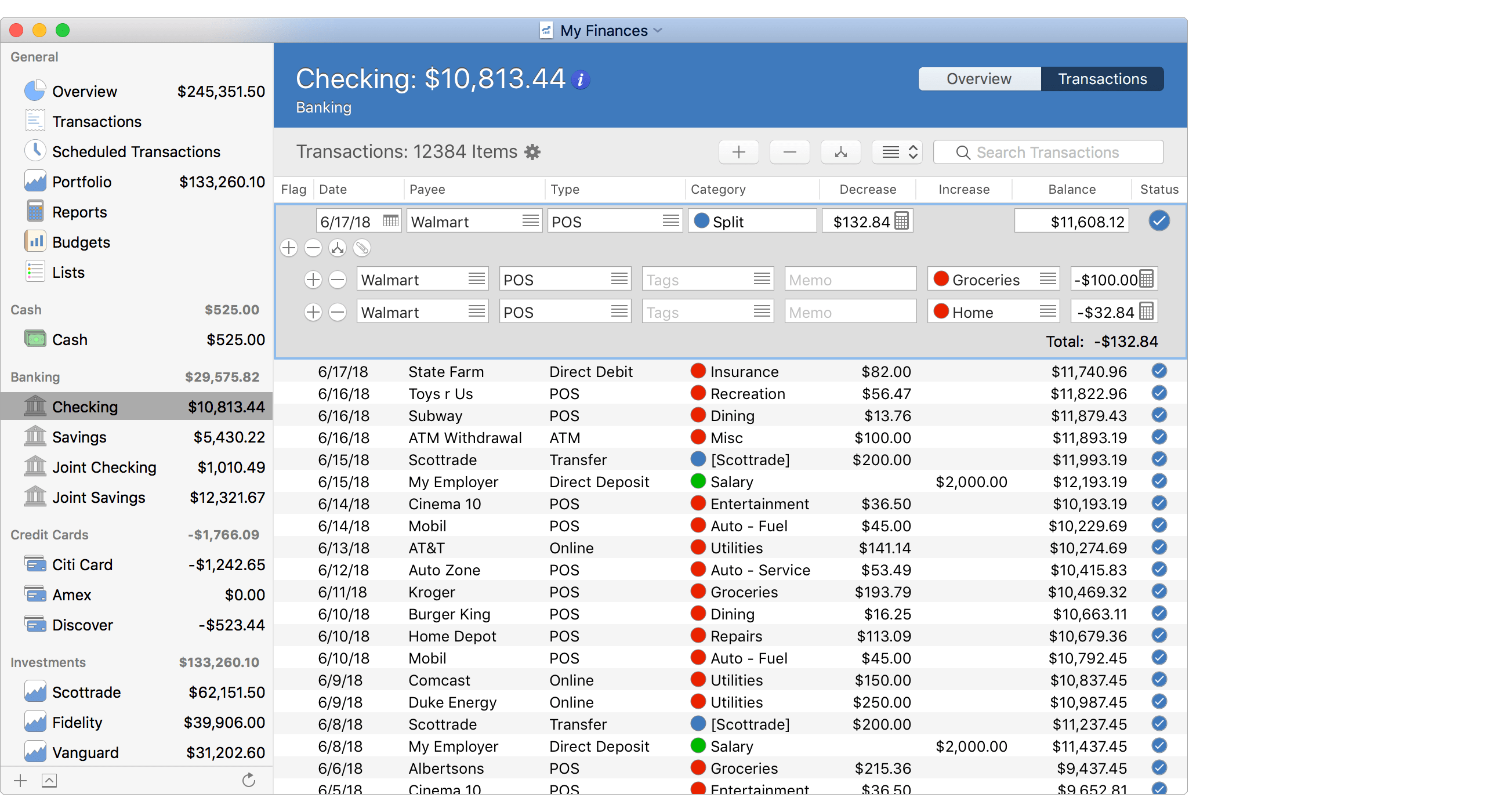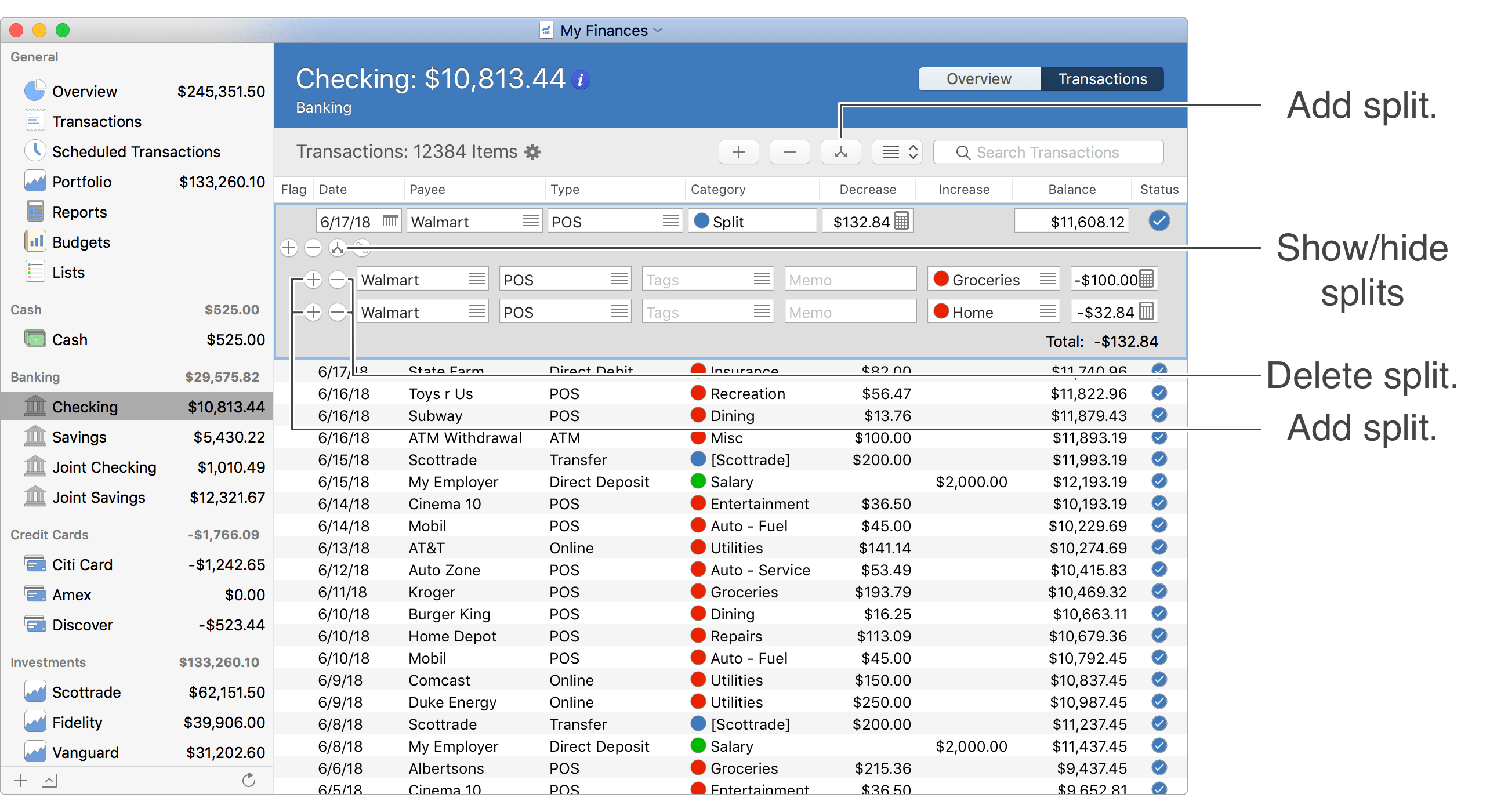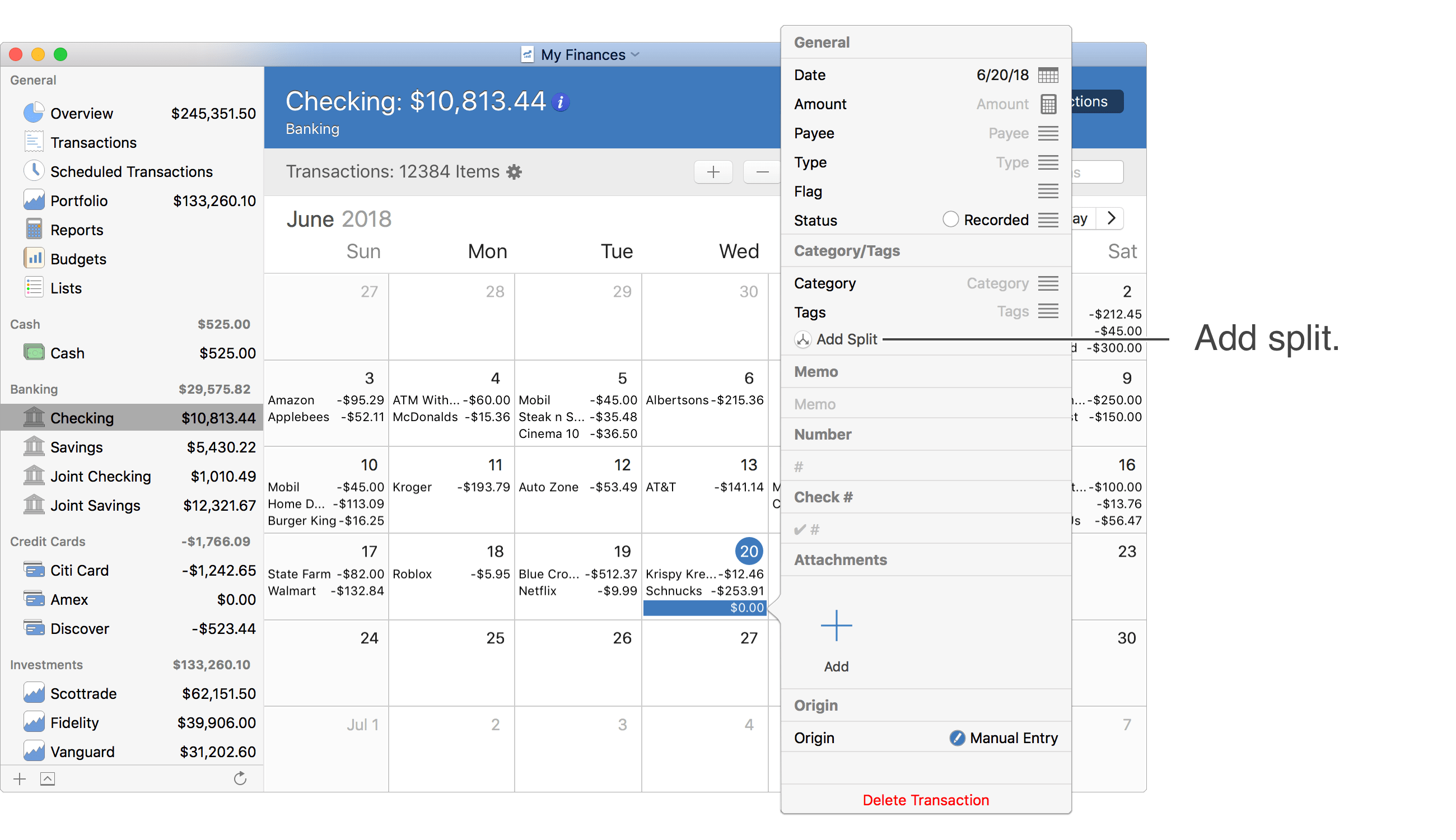Splitting transactions allow for making a detailed breakdown for transactions that involve multiple components. For example, you can split transactions for purchases at a big box stores, or websites, that span items across multiple categories. You can also split a transaction for a paycheck deposit from an employer to record the details for gross salary, taxes and other deductions. Add as many splits to a transaction as needed. Each split can have its own category, tags, memo and amount. Plus you can assign varying payees and/or transaction types when needed.

Table list view
Editing layout info:

![]() Note:
When viewing transactions in the table list view, all transactions appear with two splits by default even when they're not actually split.
This is to make adding the initial splits as easy as possible.
Note:
When viewing transactions in the table list view, all transactions appear with two splits by default even when they're not actually split.
This is to make adding the initial splits as easy as possible.
Split a transaction (List view):
- Create or select the transaction you want to split. If transactions are locked for editing, click "Edit" or press Command-E to begin editing the transaction.
- Click the
 button in the transaction's row, or from above the table of transactions, or press Command-L to split the transaction.
button in the transaction's row, or from above the table of transactions, or press Command-L to split the transaction. - When you first split a transaction there will be two splits, fill in the details for the two splits.
You can set the category, tags, memo and amount for each split.
If needed, you can also assign varying payees and/or transaction types.
If you need more than two splits, click the
 button on the left of the last split or press Command-L to add another split and then record its details
button on the left of the last split or press Command-L to add another split and then record its details - When finished editing the transaction, save the transaction by pressing Command-E, by pressing Return, or by clicking "Save".
- Click "Cancel" or press Escape (Esc) to cancel creating a new transaction or to cancel any changes made to an existing transaction.
![]() Note:
If the overall transaction's amount is not set initially, recording amounts for splits will update the overall transaction's amount.
If the overall transaction's amount is set initially, when setting the amounts for splits the last split's amount will be adjusted in order for the sum of all splits to equal the overall set amount.
If you edit the last split's amount to be something other than the difference between the overall transaction's set amount and the sum of the other splits then an additional split will be added automatically to account for the difference.
Note:
If the overall transaction's amount is not set initially, recording amounts for splits will update the overall transaction's amount.
If the overall transaction's amount is set initially, when setting the amounts for splits the last split's amount will be adjusted in order for the sum of all splits to equal the overall set amount.
If you edit the last split's amount to be something other than the difference between the overall transaction's set amount and the sum of the other splits then an additional split will be added automatically to account for the difference.
Keyboard shortcuts (List view):
- Create: Command-N
- Begin/End Editing: Command-E
- Add Split: Command-L
- Show/Hide Splits: Shift-Command-L
- Show/Hide Attachments: Shift-Command-I
- Save: Return or Command-E
- Cancel: Escape (Esc)
- Delete: Command-Delete
Review the full list of keyboard shortcuts
Calendar view
Editing layout info:


Split a transaction (Calendar view):
- Create or double click on the transaction you want to split. You can also select it and press Command-e or press Return or press the spacebar to show the popover.
- Click the
 "Add Split" button in the "Category/Tags" section of the popover, or from above the calendar of transactions, or press Command-L to split the transaction.
"Add Split" button in the "Category/Tags" section of the popover, or from above the calendar of transactions, or press Command-L to split the transaction. - When you first split a transaction there will be two splits, fill in the details for the two splits.
You can set the category, tags, and amount for each split.
If you need to set varying memos, payees or transaction types for the splits you will need to do so in the table list view.
If you need more than two splits, click the
 button on the left of the last split or press Command-L to add another split and then record its details.
button on the left of the last split or press Command-L to add another split and then record its details. - When finished editing the transaction, save the transaction by pressing Command-E, by pressing Return, or by clicking elsewhere.
- Press Escape (Esc) to cancel creating a new transaction or to cancel any changes made to an existing transaction.
![]() Note:
If the overall transaction's amount is not set initially, recording amounts for splits will update the overall transaction's amount.
If the overall transaction's amount is set initially, when setting the amounts for splits the last split's amount will be adjusted in order for the sum of all splits to equal the overall set amount.
If you edit the last split's amount to be something other than the difference between the overall transaction's set amount and the sum of the other splits then an additional split will be added automatically to account for the difference.
Note:
If the overall transaction's amount is not set initially, recording amounts for splits will update the overall transaction's amount.
If the overall transaction's amount is set initially, when setting the amounts for splits the last split's amount will be adjusted in order for the sum of all splits to equal the overall set amount.
If you edit the last split's amount to be something other than the difference between the overall transaction's set amount and the sum of the other splits then an additional split will be added automatically to account for the difference.
Keyboard shortcuts (Calendar view):
- Create: Command-N
- Begin/End Editing: Command-E
- Show Calendar Popover: Command-E, Return, or Spacebar
- Add Split: Command-L
- Save: Return or Command-E
- Cancel: Escape (Esc)
- Delete: Command-Delete
Review the full list of keyboard shortcuts
Split transaction examples
Learn how to record split transactions in the examples below.
Example:
You made a purchase for $100.00 at a big box store for both grocery and household items and would like to categorize the transaction as $75.00 for "Groceries" and $25.00 for "Home".
Steps:
- Create or select the overall transaction for -$100.00 at the big box store.
- Select to split the transaction using the
 button.
Two splits will be created.
button.
Two splits will be created. - Set the first split's category to "Groceries".
- Set the first split's amount to be -75.00. The minus sign in the amount may be needed depending on the set transaction type.
- Set the second split's category to "Home".
- The sum of all split transactions must equal the set amount for the overall transaction. Since the second split is the last split for the this transaction it will automatically have its amount set to -25.00.
- Save the transaction.
Example:
You have a paycheck deposited for $750.00 and would like your categorize gross pay of $1,000.00, federal taxes of -$100.00, state taxes of -$50.00, and an automatic transfer to a savings account of -$100.00.
Steps:
- Create or select the overall transaction for $750.00 paycheck deposit.
- Select to split the transaction using the
 button or by pressing Command-L.
Two splits will be created.
button or by pressing Command-L.
Two splits will be created. - Set the first split's category to "Salary".
- Set the first split's amount to be 1000.00.
- Set the second split's category to "Payroll Taxes - Federal" or your desired federal payroll tax category.
- Set the second split's amount to be -100.00. Note that the minus sign in the amount is needed.
- A third split should be created automatically for -150.00.
- Set the third split's category to "Payroll Taxes - State" or your desired state payroll tax category.
- Set the third split's amount to be -50.00. Note that the minus sign in the amount is needed.
- A fourth split should be created automatically for -100.00.
- Set the fourth split's category to your saving account's category, its name in brackets, such as "[Savings]".
- Save the transaction.
Example:
You went on a family vacation with three siblings, you paid the full cost of a rental house for the week upfront, and they paid you back $500.00 each. You're depositing $1,500.00 total from two checks for $500.00 each and $500.00 cash.
Steps:
- Create or select the overall transaction for $1,500.00 deposit.
- Select to split the transaction using the
 button or by pressing Command-L.
Two splits will be created.
button or by pressing Command-L.
Two splits will be created. - Set the first split's category to "Vacation" for the first check. This will offset your "Vacation" category's spending.
- Set the first split's amount to be 500.00.
- Set the first split's payee to one of your siblings.
- Set the second split's category to "Vacation".
- Set the second split's amount to be 500.00.
- Set the second split's payee to another one of your siblings.
- A third split should be created automatically for 500.00.
- Set the third split's category to "Vacation".
- Set the third split's payee to the remaining sibling.
- Save the transaction.
![]() Note:
It is of course also an option to record multiple deposit transactions as separate transactions.
Many institutions will list them separately and it is generally best to record them in the same manner as the institution in order to make reconciling easier.
Note:
It is of course also an option to record multiple deposit transactions as separate transactions.
Many institutions will list them separately and it is generally best to record them in the same manner as the institution in order to make reconciling easier.
![]() Note:
When recording transactions in a credit card account, do not create one large split transaction for each statement that is made up of the payment transaction and all of the charge transactions for the statement.
Record the transactions in the credit card account as they actually occur with the payment and charge transactions recorded separately.
Note:
When recording transactions in a credit card account, do not create one large split transaction for each statement that is made up of the payment transaction and all of the charge transactions for the statement.
Record the transactions in the credit card account as they actually occur with the payment and charge transactions recorded separately.